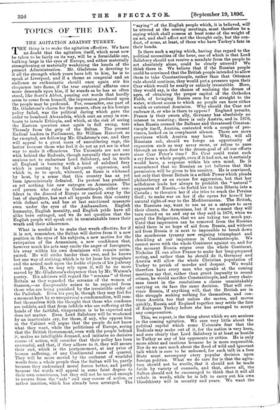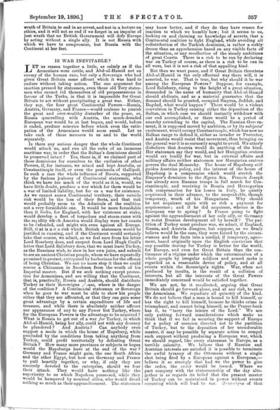TOPICS OF THE DAY.
THE AGITATION AGAINST TURKEY. THE thing is to make the agitation effective. We have no doubt that the agitation itself, which must now be taken to be fairly on its way, will be a formidable one, bulking large in the eyes of Europe, and either materially strengthening or materially weakening the hands of the present Administration. Mr. Gladstone is devoting to it all the strength which years have left to him, he is to speak at Liverpool, and if a theme so congenial and an audience so enthusiastic should once again stir his eloquence into flame, if the true oratorical afflatus once more descends upon him, if he stands as he has so often stood, like Scott's Abbot, pouring out words that hardly seem to come from himself, the impression produced upon the people may be profound. For, remember, one part of Mr. Gladstone's charm for the masses, often as his foreign policy failed, was the political daring which gave the order to bombard Alexandria, which sent an army in row- boats to invade Ethiopia, and which, at the risk of seeing the Eastern question once again in full swing, tore Thessaly from the grip of the Sultan. The present Radical leaders in Parliament, Sir William Harcourt so far excepted, are following Mr. Gladstone's cue, and they will appeal to a great mass of smouldering rage, the hotter because those who feel it do not as yet see in what way to make it efficacious. The Unionists are not one whit behind the Radicals, though naturally they are more anxious not to embarrass Lord Salisbury, and in truth all England is burning with a kind of subdued fury which is panting to find adequate expression, and which is, so to speak, whitened, as flame is -whitened by heat, by a sense that this country has as yet been ignominiously defeated. Its protest has produced as yet nothing but new outrages on Armenians. The evil person who rules in Constantinople, either con- fident in the discord of Europe or carried away by the lust of slaughter, has met all appeals from this country with defiant acts, and has at last sanctioned massacre even under the eyes of the Ambassadors. English humanity, English morality, and English pride have all alike been outraged, and we do not question that the English people will speak out in unmistakable tones their wrath and their abhorrence.
What is needed is to make that wrath effective, for if it is not, remember, the Sultan will derive from it a new position in the eyes of his subjects, a new motive for the extirpation of the Armenians, a new confidence that, however much his acts may excite the anger of foreigners, his sway within his own dominions will remain unim- paired. He will strike harder than ever, and he knows but one way of striking, which is to let loose his irregulars and the armed mob upon the feeble objects of his jealousy and rage. He, we may rely upon it, will be no more moved by Mr. Gladstone's eloquence than by Mr. Watson's poetry. His advisers will regard the " screams " of Great Britain as they regarded the screams of the women of Sassoon,—as disagreeable noises to be expected from those who are being punished by the irresistible order of the Padishah. Even his peol le, though they may feel for a moment hurt by so unequivocal a condemnation, will com- fort themselves with the thought that those who condemn are infidels, and that from infidels who are suffering at the hands of the faithful, vituperation is to be expected and does not matter. Even Lord Salisbury will be weakened by an inarticulate cry, for those, if any, who oppose him in the Cabinet will argue that the people do not know what they want, while the politicians of Europe, seeing that the British Government, even with the people behind it, makes no intelligible demand, and initiates no decisive course of action, will consider that their policy has been successful, and that, if they adhere to it, they will secure their end, which is the postponement, at any price of human suffering, of any Continental cause of quarrel. They will be more moved by the outburst of wrathful words from a whole people than the Sultan will be, partly because they understand moral forces better, and partly because the words will appeal in some faint degree to their own consciences, but they will not be moved enough to swerve from the "safe" and easy course of action, or rather inaction, which has already been arranged. The "saying" of the English people which, it is believed, will be uttered at the coming meetings, must therefore be a, saying which shall possess at least some of the weight of an act, and shall affect not the thought only, but the con- duct, of some, at least, of those who have Turkey's fate in their hands.
Is there such a saying which, having due regard to the political necessities of the hour, one of which is that Lore Salisbury should not receive a mandate from the people to act absolutely alone, could be clearly uttered? We think there is. We believe that if the Russian people could be convinced that the British people intended to allow them to take Constantinople, rather than that Ottoman rule should continue, they would put a pressure upon theii Czar which would be nearly or entirely irresistible. Here, they would say, is the chance of realising the dream of ages, of obtaining the proper capital of the Orthodox. Faith, of bringing Russia, once for all straight to the water, without access to which no people can have eithez wealth or external dominion. Why should the Czar not embrace it, or who is there to oppose ? England permits, France is their sworn ally, Germany has absolutely no interest in resisting ; there is only Austria, and iu 1878 when Russia crossed the Balkans and threatened Constan- tinople itself, Austria, contented with a couple of pro- vinces, looked on in complacent silence. There are more provinces which Austria may have. Why, will all Russians ask, should we forego an opportunity of expansion such as may never recur, or refuse to pass. through an open door to the dream-goal of all our efforts since Czar Peter's time ? No Czar could resist such a cry from a whole people, even if it had not, as it certainly would have, a response within his own mind. Be it remembered that no Russian as yet believes that this permission will be given to his country. He is convinced,, not only that Great Britain is a selfish Power which pleads philanthropy as an excuse for aggression, but that her selfishness leads her always to prohibit the " natural " expansion of Russia,—to forbid her to turn Siberia into a. Canada ; to threaten her if she tries to reach the Persian Gulf ; to make war on her if she opens for herself her natural right-of-way to the Mediterranean. The British, the Russians say, want to use us as a catspaw to save their clients, the Armenians, but if we consent they will' turn round on us and say as they said in 1878, when we saved the Bulgarians, that we are taking too much pay. Until that impression can be removed from the Russian mind there is no hope of aid from Russia, and without aid from Russia it is next to impossible to break down the murderous tyranny now reigning triumphant and chuckling at our impotence in Constantinople. We cannot move with the whole Continent against us, and for the moment Russia reigns over the whole Continent. Nicholas II. can allow France to make her long-prepared spring, and rather than he should do it, Germany and Austria will allow the whole Christian population of Turkey to perish of murder and despair. We would therefore have every man who speaks at the coming meetings say that, rather than grant impunity to recent crimes, he would sacrifice Constantinople, and every chair- man insert in the resolutions a clause unmistakably carrying on its face the same decision. That will con- vince Russia, if anything will, that the British are in this struggle seeking nothing for themselves, and con- vince Austria too that unless she moves, and moves quickly, Russia and England together may settle the fate of European Turkey before she has arranged to accept any compensation.
This, we repeat, is the thing about which we are anxious in the coming agitation. We care very little about the political capital which some Unionists fear that the Radicals may make out of it, for the nation is very keen, and sees clearly that Lord Salisbury is at least as hostile to Turkey as any of his opponents or critics. He is only more silent and cautious because he is more responsible. Nor do we care much about the flood of wild and ignorant talk which is sure to be unloosed, for such talk in a free State must accompany every popular decision upon foreign politics. What we do care for is that the agita- tion should not be sterile, that it should not be made futile by variety of counsels, and that, above all, the Sultan should not be encouraged to think that it will all exhale in words, while he is left to carry out his own bloodthirsty will in security and peace. We want the wrath of Britain to end in an arrest, and not in a lecture on ethics, and it will not so end if we forget in an impulse of just wrath that no British Government will defy Europe by acting without a single ally. It is not Russia with which we have to compromise, but Russia with the Continent at her feet.



































 Previous page
Previous page